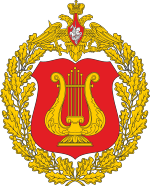Moscow Military Music College
Московский военный музыкальный колледж | |
 Academy coat of arms | |
Former name | Moscow School of Military Musicians of the Red Army |
|---|---|
| Type | military academy |
| Established | August 1, 1937 |
| Founder | Semyon Chernetsky |
| Location | , |
Valery Khalilov Moscow Suvorov Military Music College is one of the leading military music institutions in Russia. It is a separate branch of the Suvorov Military Schools in Russia, and the oldest of them all (opened 1937).
History
On August 1, 1937, the conductor and director of music of the Central Military Orchestra of the People's Commissariat of National Defense Semyon Cherneysky founded the school.[1] Pupils ages of 12 and older at first spent 3 years in the boarding school. They have been regular participants in parades on Red Square since 1938. The school was affilated with the Suvorov Military School in 1944 and was renamed the Moscow Military Music College in 1960. Since 1981, school has had a four-year term of study. The central band of the college plays not only in Russia, but also in Switzerland, Germany, France, Italy, England, Poland, and the Czech Republic. It has been a regular participant in the Spasskaya Tower military tattoo festival since 2006.[2] Its mission is to train young boys inclined to serve the Army and Air Force as bandsmen, conductors and band drum majors.
Just in time for its 80th anniversary the "Valery Khalilov" honorific title was bestowed on December 26,2016 by no less than the Minister of Defense General of the Army Sergei Shoygu - a day after the tragic crash that killed Khalilov and 91 others off Sochi while the Alexandrov Ensemble was on its way to perform for Russian troops deployed in Syria.[3] The decision was made public by the spokesperson of the MoD Major General Igor Kinashenkov.
The college is more famous internationally for its Corps of Drums, a participant in the Moscow Victory Parade of 1945 and a regular participant in Revolution Day (1938 to 1990), Victory Day (1965, 1985, 1990, 1995–2008, 2012-), and until 1966 May Day military parades. The corps is led by a Drum Major. The Corps's instrumentation includes snare drums, fifes, trumpets, glockenspiels and during occasions, bass drums, tenor drums and chromatic fanfare trumpets. A Turkish crescent from the college was used as its symbol in the Revolution Day and Victory Day parades from 1975 to 1990, later replaced in 1995 by the college's color guard squad carrying the collegiate Regimental Color (a new color was granted to the institution in 2008), preceded in parades by the Commandant of the College.
It is a recipient of the Komsomol Prize of 1987.
Commandants of the College
- Lieutenant Colonel Leonid Bank (1937-1939)
- Boris Lvovich (1939-1940)
- Colonel Vladimir Zlobin (1940-1957)
- Colonel Nikolai Nazarov (1957-1958)
- Colonel Konstantin Kamyshov (1958-1960)
- Colonel Arkady Myakishev (1961-1970)
- Colonel Vladimir Volkov (1970-1975)
- Colonel Vladimir Detisov (1975-1982)
- Colonel Konstantin Romanchenko (1982-1986)
- Colonel Arkady Dzhagupov (1986-1993)
- Colonel Gennady Afonin (1993-2005)
- Colonel Alexander Gerasimov (2005–Present)[4]
Gallery
-
Corps of Drums during the Moscow VIctory Day Parade.
-
During a concert in Moscow.
-
The cadets of the college military band in Bern. (marching band formation)
-
Concert band formation
-
Corps of Drums on parade
-
During the 1977 October Revolution Parade. Notice the Corps of Drums marching in the lead of the parade preceded by the Corps Drum Major and the College Turkish Cresent
See also
References
- ^ "Московское военно-музыкальное училище". www.sovinformburo.com. Retrieved 2017-07-28.
- ^ "Московское военно-музыкальное училище имени генерал-лейтенанта В.М.Халилова : Министерство обороны Российской Федерации". ens.mil.ru. Retrieved 2017-07-28.
- ^ https://www.youtube.com/watch?v=7jgbAAlSxVY&feature=youtu.be
- ^ "Успешной деятельности Московского военно-музыкального училища способствовал тот факт, что на протяжении всех лет его существования этим учебным заведением руководители выдающиеся деятели отечественного военно-оркестрового искусства: интенданты 2-го ранка Леонид Николаевич Банк (1937-1939), Николай Михайлович Назаров (1957-1958), Константин Васильевич Камышов (1958-1960), Аркадий Николаевич Мякишев (1961-1970), Владимир Иванович Детисов (1975-1982), Константин Иванович Романченко (1982-1986), Аркадий Емельянович Джагупов (1986-1993), Геннадий Александрович Афонин (1993-2005), Александр Петрович Герасимов (с 2005 г. — по настоящее время)".
{{cite web}}: Cite has empty unknown parameter:|dead-url=(help)







